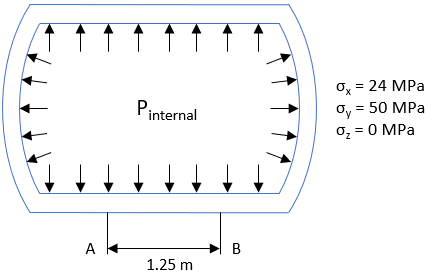Unpressurized Vessel
The shown cross section is of an unpressurized tank vessel with a modulus of elasticity of 200x10^3 MPa, a Poisson’s ratio of 0.25, a coefficient of thermal expansion of 0.000012 m/m°C, and a yield strength of 350 MPa. If the internal pressure were to increase to P such that the wall stresses between Points A & B are below, what is the increased length (along the outer wall) between Points A & B in mm?

Expand Hint
For longitudinal strain without a temperature rise:
$$$\varepsilon_{x}=\frac{1}{E}[\sigma_x-\nu(\sigma_y+\sigma_z)]$$$
where
$$E$$
is the modulus of elasticity,
$$\nu$$
is Poisson’s ratio, and
$$\sigma$$
is the normal stress.
Hint 2
Engineering strain:
$$$\varepsilon=\frac{\Delta L}{L_o}$$$
where
$$\Delta L$$
is the change in length of member, and
$$L_o$$
is the original member length.
For longitudinal strain without a temperature rise:
$$$\varepsilon_{x}=\frac{1}{E}[\sigma_x-\nu(\sigma_y+\sigma_z)]$$$
where
$$E$$
is the modulus of elasticity,
$$\nu$$
is Poisson’s ratio, and
$$\sigma$$
is the normal stress.
$$$\varepsilon_{x}=\frac{1}{200\cdot 10^3MPa}[24MPa-(0.25)(50MPa+0MPa)]$$$
$$$=\frac{1}{200\cdot 10^3MPa}[24MPa-12.5MPa]=\frac{11.5}{200\cdot 10^3}=5.75\cdot 10^{-5}$$$
For engineering strain:
$$$\varepsilon=\frac{\Delta L}{L_o}$$$
where
$$\Delta L$$
is the change in length of member, and
$$L_o$$
is the original member length.
$$$5.75\cdot 10^{-5}=\frac{\Delta L}{1,250mm}$$$
$$$\Delta L =5.75\cdot 10^{-5}(1,250mm)=0.072\:mm$$$
0.072 mm
Time Analysis
See how quickly you looked at the hint, solution, and answer. This is important for making sure you will finish the FE Exam in time.- Hint: Not clicked
- Solution: Not clicked
- Answer: Not clicked
Similar Problems from FE Sub Section: Hooke's Law
573. Hooke’s Law
Similar Problems from FE Sub Section: Engineering Strain
004. Stress and Strain
231. Subway Hand Rail
309. Strain
317. Utility Pole
350. Poisson’s Ratio
374. Test Specimen
403. Train Tracks
452. Test Coupon
573. Hooke’s Law
648. Elongating
Similar Problems from FE Section: Stress and Strain
070. In-plane Shear Stress
170. Principal Stress
559. Mohr’s Circle
573. Hooke’s Law
Similar Problems from FE Section: Definitions
002. Piston Basics
004. Stress and Strain
007. Aluminum Alloy Graphs
032. Viscosity Variations
074. Dynamic Viscosity
084. Specific Gravity
174. Elongation
202. Uniaxial Loading
214. Steam Engine Piston
231. Subway Hand Rail
235. Kinematic Viscosity
309. Strain
317. Utility Pole
332. Bulk Modulus of Elasticity
349. Compressibility Modulus
350. Poisson’s Ratio
374. Test Specimen
403. Train Tracks
446. Viscous Density
451. Poisson
452. Test Coupon
453. Shear Stress & Strain
460. Shear Modulus
463. Newtonian Fluid
467. Bulk vs Shear Modulus
469. Flow Characterization
479. Piston Loading
527. S.G.
530. Spec Weight
534. SW
573. Hooke’s Law
580. Modulus of Elasticity
648. Elongating